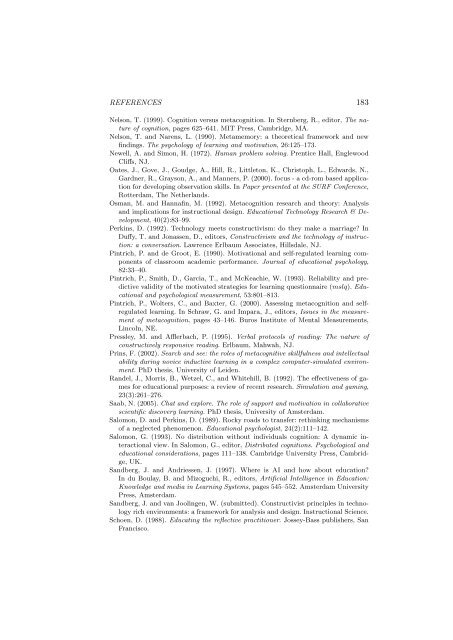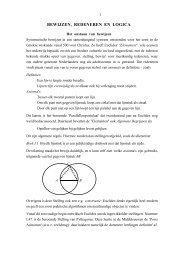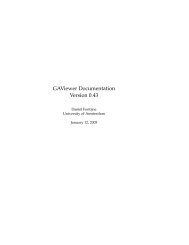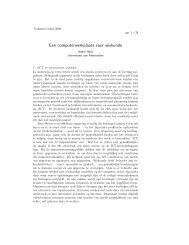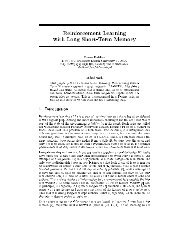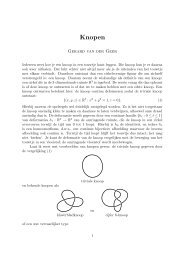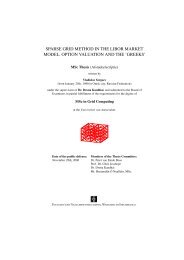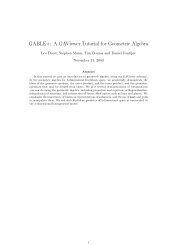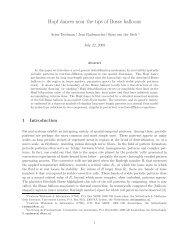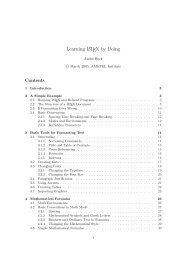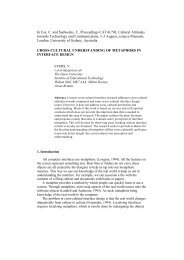The role of metacognitive skills in learning to solve problems
The role of metacognitive skills in learning to solve problems
The role of metacognitive skills in learning to solve problems
Create successful ePaper yourself
Turn your PDF publications into a flip-book with our unique Google optimized e-Paper software.
REFERENCES 183<br />
Nelson, T. (1999). Cognition versus metacognition. In Sternberg, R., edi<strong>to</strong>r, <strong>The</strong> nature<br />
<strong>of</strong> cognition, pages 625–641. MIT Press, Cambridge, MA.<br />
Nelson, T. and Narens, L. (1990). Metamemory: a theoretical framework and new<br />
f<strong>in</strong>d<strong>in</strong>gs. <strong>The</strong> psychology <strong>of</strong> learn<strong>in</strong>g and motivation, 26:125–173.<br />
Newell, A. and Simon, H. (1972). Human problem solv<strong>in</strong>g. Prentice Hall, Englewood<br />
Cliffs, NJ.<br />
Oates, J., Gove, J., Goudge, A., Hill, R., Little<strong>to</strong>n, K., Chris<strong>to</strong>ph, L., Edwards, N.,<br />
Gardner, R., Grayson, A., and Manners, P. (2000). focus - a cd-rom based application<br />
for develop<strong>in</strong>g observation <strong>skills</strong>. In Paper presented at the SURF Conference,<br />
Rotterdam, <strong>The</strong> Netherlands.<br />
Osman, M. and Hannaf<strong>in</strong>, M. (1992). Metacognition research and theory: Analysis<br />
and implications for <strong>in</strong>structional design. Educational Technology Research & Development,<br />
40(2):83–99.<br />
Perk<strong>in</strong>s, D. (1992). Technology meets constructivism: do they make a marriage? In<br />
Duffy, T. and Jonassen, D., edi<strong>to</strong>rs, Constructivism and the technology <strong>of</strong> <strong>in</strong>struction:<br />
a conversation. Lawrence Erlbaum Associates, Hillsdale, NJ.<br />
P<strong>in</strong>trich, P. and de Groot, E. (1990). Motivational and self-regulated learn<strong>in</strong>g components<br />
<strong>of</strong> classroom academic performance. Journal <strong>of</strong> educational psychology,<br />
82:33–40.<br />
P<strong>in</strong>trich, P., Smith, D., Garcia, T., and McKeachie, W. (1993). Reliability and predictive<br />
validity <strong>of</strong> the motivated strategies for learn<strong>in</strong>g questionnaire (mslq). Educational<br />
and psychological measurement, 53:801–813.<br />
P<strong>in</strong>trich, P., Wolters, C., and Baxter, G. (2000). Assess<strong>in</strong>g metacognition and selfregulated<br />
learn<strong>in</strong>g. In Schraw, G. and Impara, J., edi<strong>to</strong>rs, Issues <strong>in</strong> the measurement<br />
<strong>of</strong> metacognition, pages 43–146. Buros Institute <strong>of</strong> Mental Measurements,<br />
L<strong>in</strong>coln, NE.<br />
Pressley, M. and Afflerbach, P. (1995). Verbal pro<strong>to</strong>cols <strong>of</strong> read<strong>in</strong>g: <strong>The</strong> nature <strong>of</strong><br />
constructively responsive read<strong>in</strong>g. Erlbaum, Mahwah, NJ.<br />
Pr<strong>in</strong>s, F. (2002). Search and see: the <strong>role</strong>s <strong>of</strong> <strong>metacognitive</strong> skillfulness and <strong>in</strong>tellectual<br />
ability dur<strong>in</strong>g novice <strong>in</strong>ductive learn<strong>in</strong>g <strong>in</strong> a complex computer-simulated environment.<br />
PhD thesis, University <strong>of</strong> Leiden.<br />
Randel, J., Morris, B., Wetzel, C., and Whitehill, B. (1992). <strong>The</strong> effectiveness <strong>of</strong> games<br />
for educational purposes: a review <strong>of</strong> recent research. Simulation and gam<strong>in</strong>g,<br />
23(3):261–276.<br />
Saab, N. (2005). Chat and explore. <strong>The</strong> <strong>role</strong> <strong>of</strong> support and motivation <strong>in</strong> collaborative<br />
scientific discovery learn<strong>in</strong>g. PhD thesis, University <strong>of</strong> Amsterdam.<br />
Salomon, D. and Perk<strong>in</strong>s, D. (1989). Rocky roads <strong>to</strong> transfer: reth<strong>in</strong>k<strong>in</strong>g mechanisms<br />
<strong>of</strong> a neglected phenomenon. Educational psychologist, 24(2):111–142.<br />
Salomon, G. (1993). No distribution without <strong>in</strong>dividuals cognition: A dynamic <strong>in</strong>teractional<br />
view. In Salomon, G., edi<strong>to</strong>r, Distributed cognitions. Psychological and<br />
educational considerations, pages 111–138. Cambridge University Press, Cambridge,<br />
UK.<br />
Sandberg, J. and Andriessen, J. (1997). Where is AI and how about education?<br />
In du Boulay, B. and Mizoguchi, R., edi<strong>to</strong>rs, Artificial Intelligence <strong>in</strong> Education:<br />
Knowledge and media <strong>in</strong> Learn<strong>in</strong>g Systems, pages 545–552. Amsterdam University<br />
Press, Amsterdam.<br />
Sandberg, J. and van Jool<strong>in</strong>gen, W. (submitted). Constructivist pr<strong>in</strong>ciples <strong>in</strong> technology<br />
rich environments: a framework for analysis and design. Instructional Science.<br />
Schoen, D. (1988). Educat<strong>in</strong>g the reflective practitioner. Jossey-Bass publishers, San<br />
Francisco.


